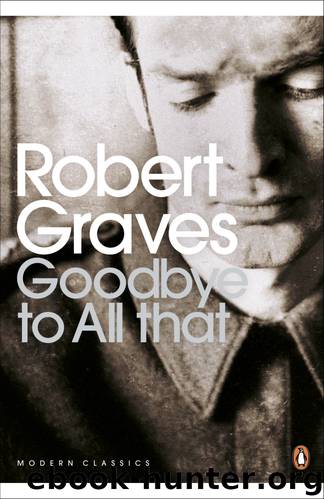Good-bye to All That: An Autobiography (Penguin Modern Classics)

Author:Robert Graves [Graves, Robert]
Language: eng
Format: epub
ISBN: 9780141395272
Publisher: Penguin Books Ltd
Published: 2014-04-30T16:00:00+00:00
XVIII
I rejoined the First Battalion in March, finding it in the line again, on the Somme. It was the primrose season. We went in and out of the Fricourt trenches, with billets at Morlancourt, a country village at that time untouched by shell-fire. (Later it was knocked to pieces; the Australians and the Germans captured and recaptured it from each other several times, until there was nothing left except the site.) ‘A’ Company headquarters were in a farmhouse kitchen. We slept in our valises on the red-brick floor. The residents were an old lady and her daughter. The old lady was senile and paralysed; about all she could do was to shake her head and say: ‘Triste, la guerre.’ We called her ‘Triste la Guerre’. Her daughter used to carry her about in her arms.
The Fricourt trenches were cut in chalk, which was better in wet weather than the La Bassée clay. We were unlucky in having a battalion-frontage where the lines came closer to each other than at any other point for miles. It was only recently that the British line had been extended down to the Somme. The French had been content, as they usually were, unless they definitely intended a battle, to be at peace with the Germans and not dig in too near. But here there was a slight ridge and neither side could afford to let the other hold the crest, so they shared it, after a prolonged dispute. It was used by both the Germans and ourselves as an experimental station for new types of bombs and grenades. The trenches were wide and tumbledown, too shallow in many cases, and without sufficient traverses. The French had left relics of their nonchalance – corpses buried too near the surface; and of their love of security – a number of lousy but deep dug-outs. We busied ourselves raising the front-line parapet and building traverses to limit the damage of the trench-mortar shells that were continually falling. Every night not only the companies in the front line but both support companies were hard at work all the time. It was even worse than Cuinchy for rats; they used to run about A Company mess while we were at meals. We used to eat with revolvers beside our plates and punctuate our conversation with sudden volleys at a rat rummaging at somebody’s valise or crawling along the timber support of the roof above our heads. A Company officers were gay. We had all been in our school choirs except Edmund Dadd, who sang like a crow, and we used to chant church anthems and bits of cantatas whenever things were going well. Edmund insisted on joining in.
We were at dinner one day when a Welsh boy came rushing in, hysterical with terror. He shouted out to Richardson: ‘Sirr, sirr, there is a trenss-mortar in my dug-out.’ This in sing-song Welsh made us all shout with laughter. Richardson said: ‘Cheer up, 33 Williams, how did a big thing like a trench-mortar happen to be in your dug-out?’ But 33 Williams could not explain.
Download
This site does not store any files on its server. We only index and link to content provided by other sites. Please contact the content providers to delete copyright contents if any and email us, we'll remove relevant links or contents immediately.
| France | Germany |
| Great Britain | Greece |
| Italy | Rome |
| Russia | Spain & Portugal |
Fanny Burney by Claire Harman(26603)
Empire of the Sikhs by Patwant Singh(23086)
Out of India by Michael Foss(16853)
Leonardo da Vinci by Walter Isaacson(13337)
Small Great Things by Jodi Picoult(7143)
The Six Wives Of Henry VIII (WOMEN IN HISTORY) by Fraser Antonia(5515)
The Wind in My Hair by Masih Alinejad(5095)
A Higher Loyalty: Truth, Lies, and Leadership by James Comey(4964)
The Crown by Robert Lacey(4817)
The Lonely City by Olivia Laing(4802)
Millionaire: The Philanderer, Gambler, and Duelist Who Invented Modern Finance by Janet Gleeson(4478)
The Iron Duke by The Iron Duke(4356)
Papillon (English) by Henri Charrière(4274)
Sticky Fingers by Joe Hagan(4199)
Joan of Arc by Mary Gordon(4113)
Alive: The Story of the Andes Survivors by Piers Paul Read(4033)
Stalin by Stephen Kotkin(3969)
Aleister Crowley: The Biography by Tobias Churton(3640)
Ants Among Elephants by Sujatha Gidla(3467)
